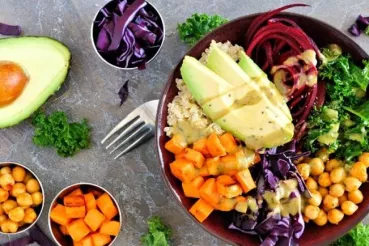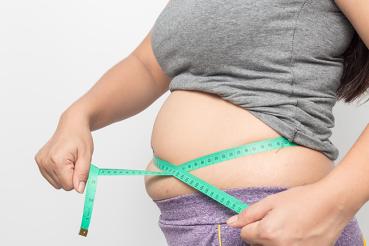The holidays are a time for family, friends and lots of delicious and special foods! For many people, celebrations and holiday meals can cause stomach upset, including intestinal discomfort, acid reflux, indigestion, heartburn and more.
Rush Copley family physician Jessica Kass, MD, shares tips to keep your digestive health in check this holiday season.
Make healthy choices
Know what constitutes a healthy diet and choose wisely when you’re facing tables full of food. Holidays and weight gain often go hand in hand. To avoid that, go for fruits, vegetables and a variety of protein, including fish, lean meat, poultry, eggs, beans, peas, nuts and seeds.
Keep trans fats — found in margarines, processed foods, crackers, cookies and fast foods — to a minimum. Unsaturated fats are better choices. These include avocado, peanut butter, nuts and seeds. Choose whole grains found in barley, oatmeal, brown rice, whole wheat breads and pastas over refined fibers, found in pasta, white breads and white rice.
Alcohol and sweetened beverages
What’s a holiday celebration without a toast? Kass advises consuming alcohol in moderation, limiting yourself to no more than a drink or two a day.
Moderation is also key with soft drinks, sweetened beverages and coffee. Water is always a good option.
Irritable bowel syndrome and the holidays
If you are one of the 10% to 15% of Americans with irritable bowel syndrome, commonly known as IBS, be warned that the symptoms, which include recurring gut pain or discomfort with diarrhea or constipation or both, are worse over the holidays because of unhealthy foods and stress.
Cookies and pies contain artificial sugars, which are not good for IBS and cause bloating. Stress increases cortisol which worsens symptoms and doesn’t allow food to digest properly.
Kass recommends sticking to a routine over the holidays, asking about ingredients in cooked foods and identifying triggers for your symptoms.
“If meatballs are a trigger, eat smaller portions or avoid them altogether,” she says. “If you are lactose intolerant, keep Lactaid tablets with you. Stay hydrated to prevent constipation. Know your body and don’t overdo it.”
Her other recommendations: Stay away from caffeine and carbonated beverages, which cause gas and heartburn, and consider tea as an alternative. Don’t overeat (it takes four to five hours for food to go through the small intestine). Use docusate or MiraLAX for constipation. If you have diarrhea, Imodium can help but you should also check with others who attended the same celebration. Often, food is left out at buffets longer than it should be, increasing risk for infection associated with diarrhea.
Avoid acid reflux
Acid reflux symptoms include a burning in the chest or upper abdomen, sore throat, belching, hoarseness and difficulty swallowing. Large meals exacerbate symptoms so she recommends eating less at each sitting. Other tips include avoiding smoking and triggers like spicy and fatty foods, tomatoes, citrus, alcohol, onion, chocolate and caffeine. Do not wear tight clothes or lie down for three hours after eating. When going to bed, use pillows to elevate your head by four to six inches.
Relieve heartburn
Need to relieve and prevent heartburn? Use antacids like Tums or Pepcid as needed. For more severe cases, Prilosec and similar medications are available over the counter but should be taken continuously for at least two weeks, rather than as needed.
Helpful holiday tips
In general, Kass recommends the following tips this holiday season.
• Be active, get plenty of sleep and control stress.
• Snack wisely.
• Watch portion sizes, use a smaller plate and practice mindful eating.
• Bring a healthy dish to a potluck.
• Limit desserts.
• Weigh yourself daily.
With a little forethought and wise eating, you and your digestive system can enjoy the holidays!




